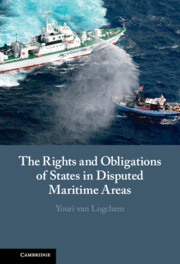Book contents
- The Rights and Obligations of States in Disputed Maritime Areas
- The Rights and Obligations of States in Disputed Maritime Areas
- Copyright page
- Contents
- Preface and Acknowledgements
- Cases
- Treaties and Legislation
- Abbreviations
- 1 Introduction
- 2 Disputed Maritime Areas: Setting the Scene
- 3 Disputed Maritime Areas: General Rules of International Law
- 4 Disputed Territorial Sea and Contiguous Zone Areas: Applicable Conventional Rules
- 5 Disputed EEZ and Continental Shelf Areas: Applicable Conventional Rules
- 6 Case Law Involving the Rights and Obligations of States in Disputed Maritime Areas
- 7 Disputed Waters Generated by Claims Made from Disputed Land Territory: What Are the Rights and Obligations of States?
- 8 Acts of Unilateralism in Disputed Maritime Areas: A Survey of State Practice
- 9 Are the Rights and Obligations of States in Disputed Maritime Areas Sufficiently Defined in International Law?
- Index
8 - Acts of Unilateralism in Disputed Maritime Areas: A Survey of State Practice
Published online by Cambridge University Press: 01 October 2021
- The Rights and Obligations of States in Disputed Maritime Areas
- The Rights and Obligations of States in Disputed Maritime Areas
- Copyright page
- Contents
- Preface and Acknowledgements
- Cases
- Treaties and Legislation
- Abbreviations
- 1 Introduction
- 2 Disputed Maritime Areas: Setting the Scene
- 3 Disputed Maritime Areas: General Rules of International Law
- 4 Disputed Territorial Sea and Contiguous Zone Areas: Applicable Conventional Rules
- 5 Disputed EEZ and Continental Shelf Areas: Applicable Conventional Rules
- 6 Case Law Involving the Rights and Obligations of States in Disputed Maritime Areas
- 7 Disputed Waters Generated by Claims Made from Disputed Land Territory: What Are the Rights and Obligations of States?
- 8 Acts of Unilateralism in Disputed Maritime Areas: A Survey of State Practice
- 9 Are the Rights and Obligations of States in Disputed Maritime Areas Sufficiently Defined in International Law?
- Index
Summary
Chapter 8 focuses on State practice, with an emphasis on acts taken unilaterally by States in disputed maritime areas, due to which a conflict has arisen in bilateral relations. To provide the most complete picture of acts undertaken unilaterally in disputed waters, examples have been collected from two types of disputes: first, where disputes to title to territory underlie the disputed maritime areas; and, second, where overlapping claims to maritime zones exist. Unilateral conduct in disputed maritime areas is not exclusively concentrated to certain parts of the world. Varying extents of conflicts are created in State practice when activities under the authority of the coastal State – including concessioning, seismic work, exploratory drilling, exploitation, marine scientific research and fisheries activities – are undertaken unilaterally in a disputed maritime area. Reacting to such a unilateral act is often seen as vital by a claimant State, and these reactions can take various forms, including law enforcement. Acting in response might be a double-edged sword, however, as this reaction can sometimes set in motion a spiral of action and reaction, whereby each State feels obligated to react to the other’s act, so as to defend their sovereign rights and interests.
Keywords
- Type
- Chapter
- Information
- The Rights and Obligations of States in Disputed Maritime Areas , pp. 249 - 289Publisher: Cambridge University PressPrint publication year: 2021

